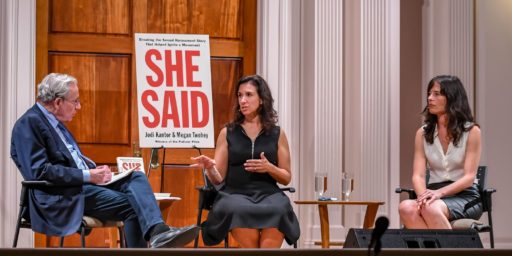The Rise of the Newsbooks
Slate‘s Jack Shafer provides an interesting look at a recently exploding genre of books he dubs “newsbooks,” which “straddles the space between contemporary history and daily journalism.” More than quickie books but less than polished histories published after the facts are in, they “break the sort of news that the dailies follow for days and sometimes weeks.”
Bob Woodward and Carl Bernstein probably invented the genre with The Final Days, their scoop-filled 1976 book about the Nixon White House. (All the President’s Men is a terrific book, but its lack of breaking news disqualifies it from newsbook status.)
[…]
How do newsbooks break news on beats already super-saturated with reporters? Washington Post ombudsman Deborah Howell dealt with this question in her Sunday column. A reader wrote Howell that she regards it “immoral” for Post journalists to withhold their revelatory accounts from the newspaper until their book is ready to be excerpted in its pages. (I’m paraphrasing.) Longtime Postie Karen DeYoung, author of a new—and yes, recently excerpted in the Washington Post—biography of Colin Powell, tells Howell that people are more willing to go on the record with a book author as opposed to a daily beat reporter because it gives them an opportunity to speak to “posterity.”
[…]
Some of Godfather Woodward’s sources are persuaded by the different—some would say lower—journalistic standards he observes. Woodward persuades some sources to sing by promising not to quote them or describe them as a source, which gives them the deniability they desire. (Call it speaking to posterity without pain.) When it comes time to write, Woodward assumes the omniscient position and describes what people were thinking or what they said without attributing it to anybody. Woodward breaks mucho news this way, and I’m not as critical as most about his unorthodox techniques. He stakes his reputation on the quality of the information he collects as opposed to its provenance. Given that newspaper and magazine editors forbid reporters from practicing Woodward-like techniques, it’s absurd for readers to expect reporters to achieve Woodward-like results.
While I share the concern about reporters holding legitimate news back for their books, let alone about Woodward’s loose fealty to journalistic ethics, the end result is often quite valuable.






It’s a pretty amazing commentary on the state of journalism today, that if you have some serious analysis to present, you’ve gotta do it in a book.
Mostly, I think it’s just more lucrative. Even feature length pieces in prestige magazines like The Atlantic Monthly or The New Yorker pay only a few grand. A bestselling non-fiction book could conceivably be worth hundreds of thousands.